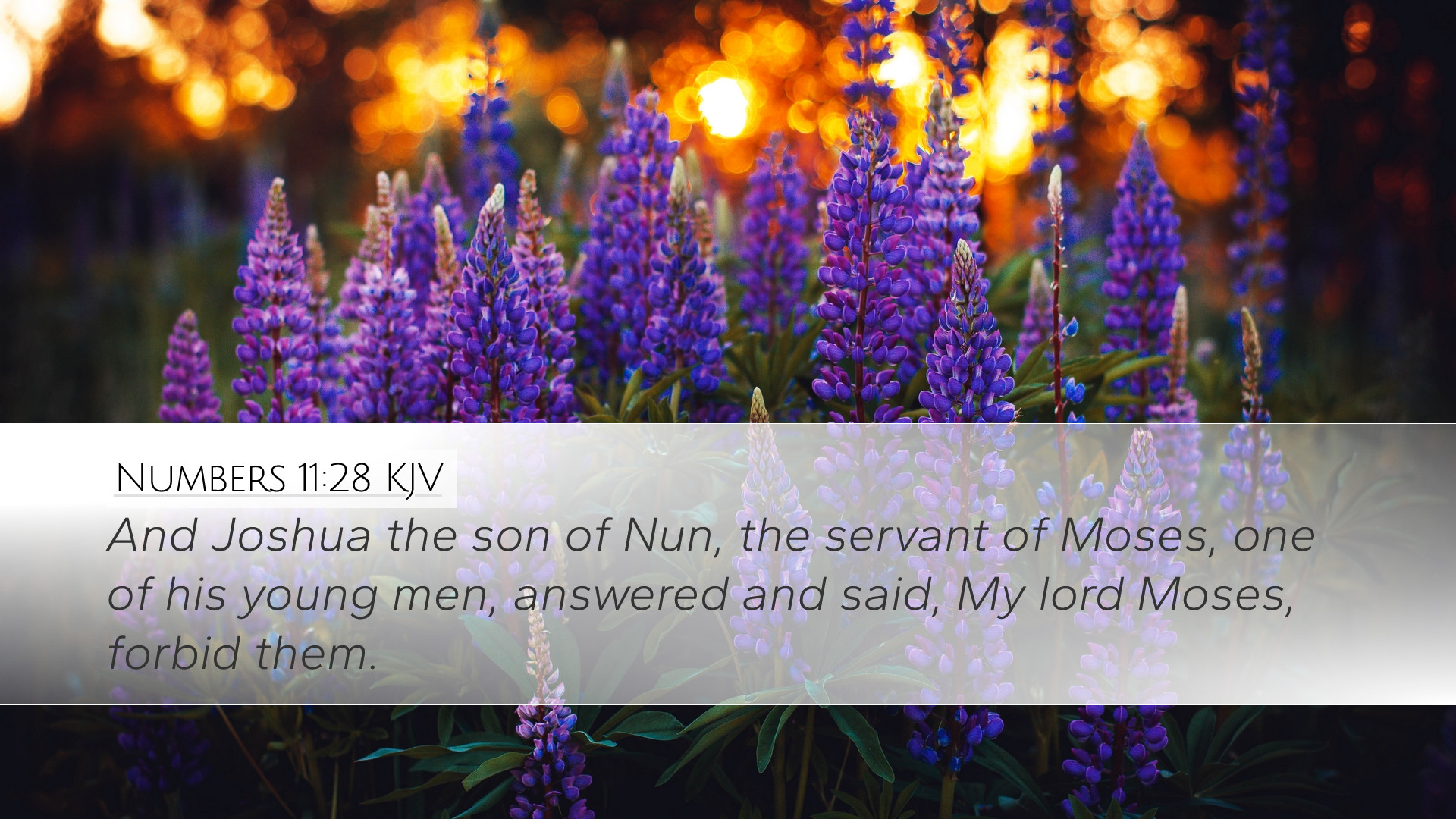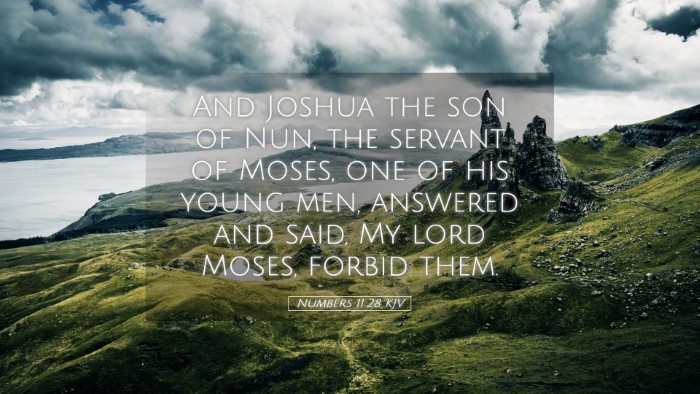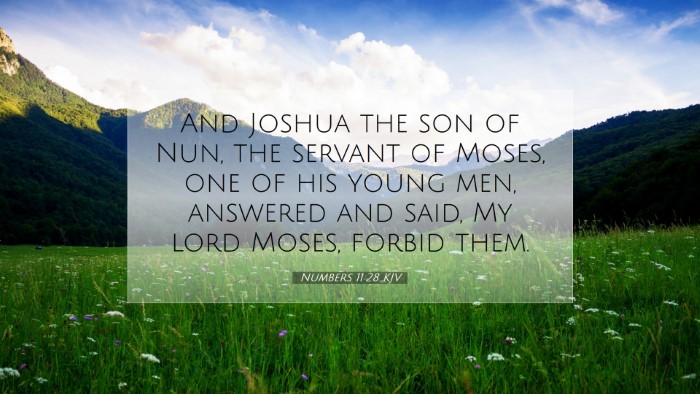Commentary on Numbers 11:28
Verse Text: "And Joshua the son of Nun, the servant of Moses, one of his young men, answered and said, My lord Moses, forbid them." (Numbers 11:28)
Introduction
This verse provides a glimpse into the leadership dynamics within the Israelites during their wilderness journey. It highlights the role of Joshua, a key figure in Israel's history, as he expresses concern regarding the prophetic acts of others outside of Moses' immediate authority. The commentaries of Matthew Henry, Albert Barnes, and Adam Clarke offer valuable insights into this passage, providing theological and practical implications for today's readers.
Contextual Background
Before dissecting the specifics of Numbers 11:28, it is essential to understand the context surrounding this scripture. The Israelites were at a crucial point in their journey, having been delivered from Egypt but struggling with various challenges and rebellions against God's appointed leadership.
The Selection of Elders
In the preceding verses, we learn that God instructed Moses to appoint seventy elders to help bear the burden of leadership and guide the people. The Spirit of God descended upon these elders, enabling them to prophesy, which created a sense of unease among some, including Joshua.
Insights from Matthew Henry
Matthew Henry comments on the significance of Joshua's position as a servant to Moses. He notes that Joshua demonstrates loyalty, which is commendable in a leader. However, his response reflects a misunderstanding of the broader workings of God's Spirit.
- Servanthood: Henry emphasizes Joshua’s identity as a servant, setting a model for future leaders. Servanthood is linked to true greatness in God’s economy.
- Jealousy of Authority: Joshua’s jealousy for Moses reflects a natural human concern for authority and integrity, but it also showcases the limitations of human understanding regarding God’s purposes.
- Expansion of God's Work: Henry argues that Joshua's attitude reveals a fear that the prophetic outpouring could undermine Moses' unique leadership. However, God's Spirit can empower many without diminishing one another's roles.
Insights from Albert Barnes
Albert Barnes provides a detailed exegesis on this passage, focusing on the implications of being a servant of God and the authority of leadership.
- The Nature of Leadership: Barnes explains that Moses’ leadership is divinely appointed and unique, meant to guide and instruct the people in God’s ways. Joshua’s concern expresses a protective instinct towards Moses’ leadership.
- Prophetic Inspiration: He highlights the importance of prophetic acts in the community. The Spirit's presence upon the elders does not in any way diminish Moses’ authority but instead confirms God’s presence among the people.
- God's Sovereignty: Barnes points out that God can choose to work through different vessels. The Holy Spirit’s work is not confined by human boundaries or expectations.
Insights from Adam Clarke
Adam Clarke delves into the historical and theological significance of the occurrences. He also reflects on the spiritual implications of Joshua's remarks.
- Historical Context: Clarke provides insights into the framework of Israelite governance and the cultural expectations regarding prophetic authority and leadership.
- Understanding Jealousy: His interpretation stresses how jealousy can cloud judgment. Joshua's protective nature, although noble, indicates a lack of understanding of God’s expansive mission.
- Encouragement for Broader Ministry: Clarke posits that this event lays the groundwork for understanding a more communal exercise of faith and prophecy, preparing Israel for future leadership under diverse individuals.
Theological Themes
The broader theological themes in this passage include:
- The Role of the Spirit: The action of the Spirit being upon the elders emphasizes that God equips many for His purposes, not just a singular leader.
- Leadership Dynamics: The dynamics between Moses, Joshua, and the newly appointed elders reflect the interplay of authority, service, and the workings of the Holy Spirit in leadership.
- God’s Democratic Calling: The sharing of the Spirit among many signifies God’s inclusive approach to leadership—one that allows for various forms of ministry to flourish.
Practical Applications
This scripture presents several practical applications for today's pastors, students, theologians, and Bible scholars:
- Encouragement for Servant Leadership: Embrace the call to servanthood, recognizing that true leadership is marked by a commitment to serve others.
- Openness to the Spirit’s Movement: Remain open to how God may be working outside our immediate expectations, empowering diverse leaders within the community.
- Overcoming Jealousy: Foster an environment where the gifting and calling of others is celebrated rather than perceived as a threat to existing authority.
Conclusion
Numbers 11:28 serves as a powerful reminder of the dynamics of leadership, the workings of the Holy Spirit, and the call to humble servanthood. By learning from Joshua’s response and God’s sovereign actions, modern leaders can cultivate communities where God’s presence is acknowledged and celebrated across varying forms of ministry.


